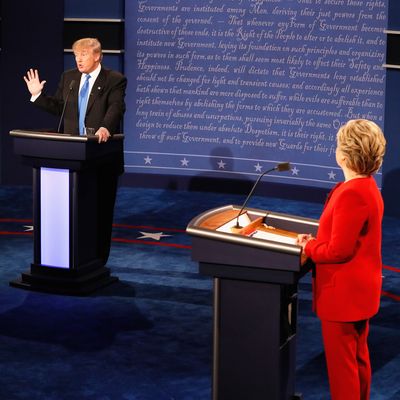
Without any question, Sunday night’s town-hall debate between Hillary Clinton and Donald Trump will be must-see TV. And there is always the possibility of a killer line or a monster gaffe (e.g., Poppy Bush’s impatient glance at his watch while being questioned about his empathy for the experiences of “common people” during a similar debate in 1992) that will embed itself in the minds of voters through November 8.
But if you are anxious about your candidate’s performance and the possibility that 90 minutes will wipe out years of campaigning — well, you might want to chill out. For various reasons, the second debate is likely to have less of an impact than the first.
For one thing, political-science research has found that initial debates have more of an impact than subsequent confrontations, for the obvious reason that they provide first and durable impressions of the candidates in a debate context.
In fact, there’s no clear precedent for big changes in a presidential race after a second debate, with the arguable exception of 2000, when George W. Bush was steadily gaining in the polls throughout the debate season. In 2012, Obama did much better in the second than in the first debate with Mitt Romney, but got no real polling bounce. And even if the candidate perceived as “losing” the first debate (in this case Trump) “wins” the second and moves up in the polls, we won’t be able to tell for sure whether the debate made the difference or whether the first-debate bounce is just fading.
The Washington University debate may also matter less than the one at Hofstra because there is a smaller group of persuadable voters left. This is particularly good news for the current front-runner, Hillary Clinton, as Harry Enten points out:
Clinton and Donald Trump now combine for a little over 84 percent of the vote. That’s the highest their combined share has been since we started issuing our forecasts in June …
With more voters committed to one of the two major-party nominees, Trump simply has fewer people he can appeal to in order to make up his current deficit, which makes Clinton’s lead more secure.
Finally, the town-hall format, in which half the questions are asked by the undecided voters in the audience, probably makes direct interaction between the candidates trickier. Typically these “real people” lean toward more substantive — which to the debate aficionado means more boring —questions, so the opportunity for crushing zingers is limited.
So while anything can happen, the more important debate has probably already happened, and that’s good news for Clinton fans.






























